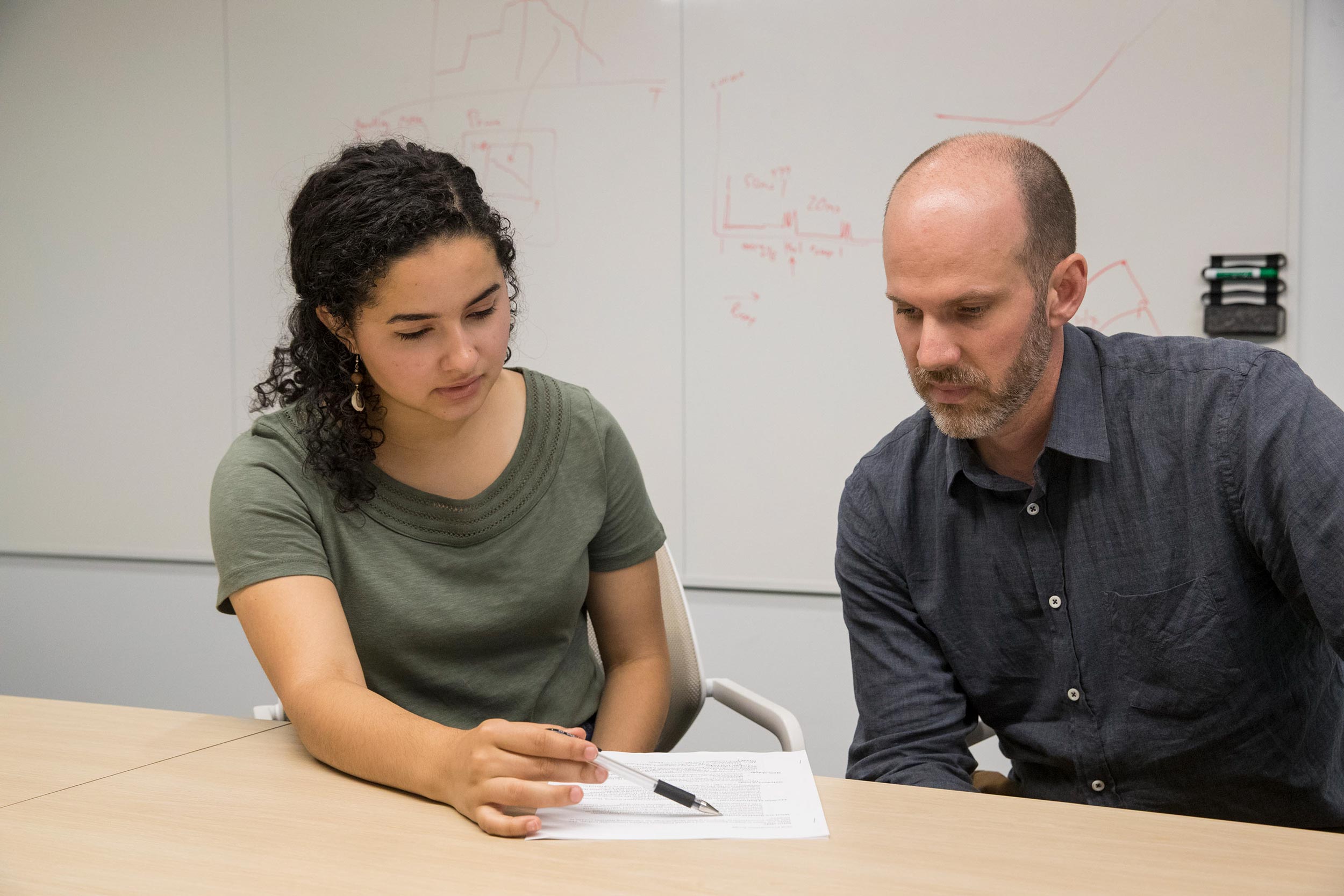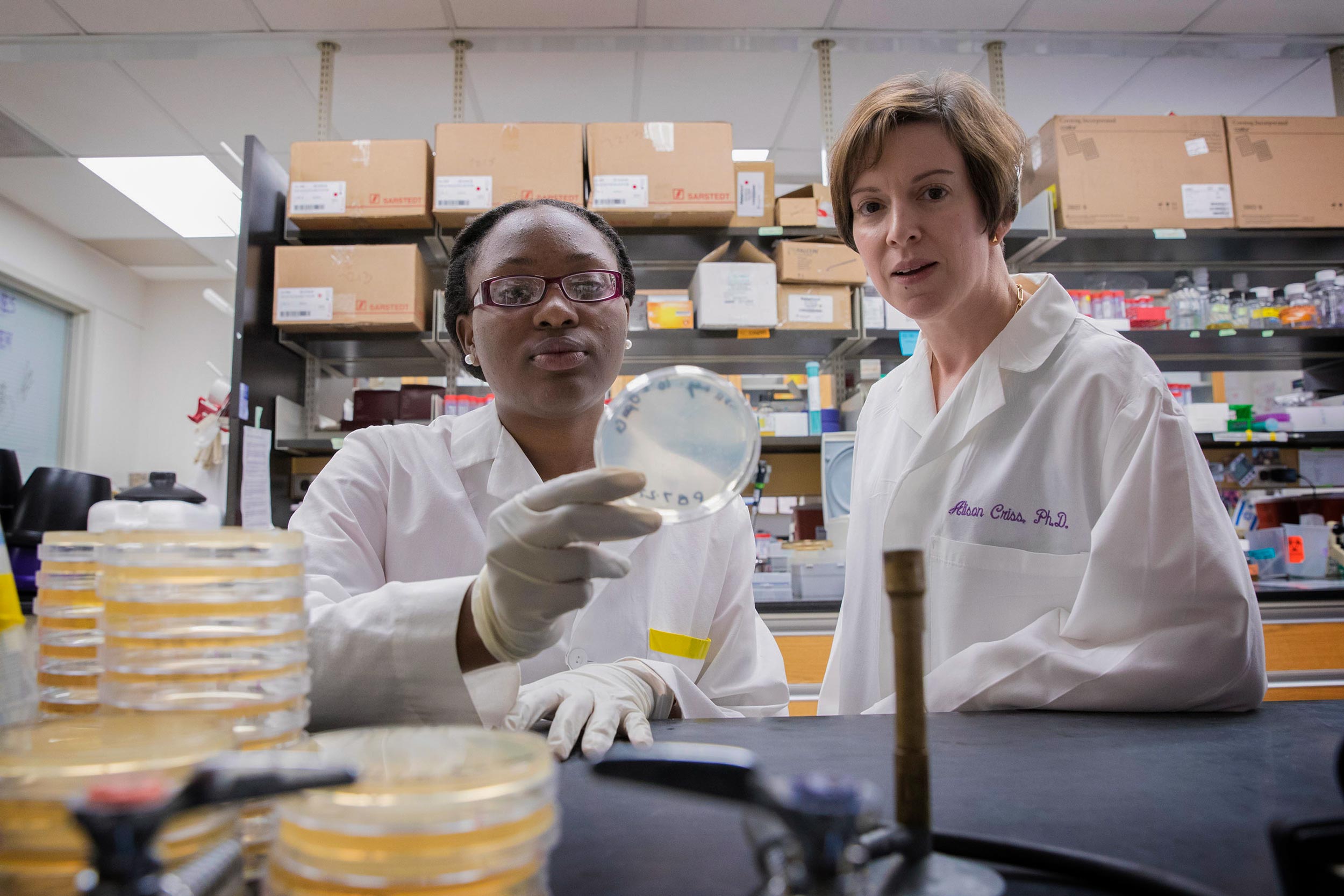For students in the VA-NC Alliance for Minority Participation, a summer research program at the University of Virginia showed them career paths in STEM fields they hadn’t considered before and gave them potentially life-changing experiences.
“This program has opened my eyes to the environmental side of engineering,” said Sophia Keniston, a second-year student at Piedmont Virginia Community College, who said she might transfer to UVA.
Her first research experience “rearranged my entire perspective of research,” said Princess Bush, a rising third-year student at Bennett College in Greensboro, North Carolina.
Led by UVA and launched 12 years ago, the alliance is devoted to increasing the number of students from minority groups that have been underrepresented in science, technology, engineering and math disciplines. In its third phase of funding from the National Science Foundation’s Louis Stokes Alliances for Minority Participation, the VA-NC program is one of more than 40 consortiums around the country.
The alliance brings together large research universities, historically black colleges and universities, and community colleges to offer individually tailored recruitment, retention and enhancement activities to support students interested in advanced study or professions in STEM fields. Participants are African Americans, Hispanic Americans, American Indians, Alaska Natives, Native Hawaiians, and Native Pacific Islanders and students who report more than one of the above.
Over the years, the VA-NC Alliance has grown from eight to 12 partner institutions: Bennett College, Elizabeth City State University (part of the University of North Carolina system), George Mason University, Johnson C. Smith University (in Charlotte), National Radio Astronomy Observatory, Old Dominion University, Piedmont Virginia Community College, Saint Augustine’s University (in Raleigh), Thomas Nelson Community College, the University of Virginia, Virginia Commonwealth University and Virginia Tech.

Sophia Keniston, who is studying engineering at PVCC, worked with civil engineering professor Jon Goodall in his hydroinformatics lab.
The partnering schools offer mentoring, research opportunities, workshops, internships, attendance at local and national symposia, and participation in UVA’s annual Summer Research Program, created specifically for alliance students 10 years ago.
“The VA-NC Alliance Summer Research Program is often the first experience our students have conducting undergraduate research outside of their course labs,” program director Kristin Morgan said. She serves as co-principal investigator of the alliance led by Kevin McDonald, vice president for diversity, equity, and inclusion, who became the principal investigator after Dr. Marcus Martin retired. Maurice Walker works as program coordinator.
About 25 UVA faculty members over the years have opened their labs to the summer students to give them research experience. Along with the graduate students working there, they provide advice and guidance about pathways to STEM careers, especially the graduate school process.
One year, a group of students even discovered a new molecule in space.
“During the summer program at UVA, students learn about the high value that graduate school admissions committees place on rigorous research experiences as they evaluate applicants,” Morgan said. “We collaborate with the Office of Graduate and Postdoctoral Affairs to provide summer researchers with professional development sessions to prepare them for the graduate school application process, including GRE prep courses, writing workshops and panel discussions with faculty and graduate students.”
“This program has helped me to decide on a STEM field by exposing me to careers and opportunities in research that I had not previously considered. ”
- Princess Bush, Bennett College student
Bush, who grew up in Orlando, Florida, and is majoring in biology at Bennett College, said, “I realize that research is a way that I may selflessly serve my community. This program has challenged my view of what a career is and has provided me with information that I will use to choose a career in the STEM field that is authentic to me, while serving others.”
She worked with Alison Criss, associate professor of microbiology, immunology and cancer biology in the School of Medicine, on research seeking to understand how the most drug-resistant strains of gonorrhea work.
Criss said she’s committed to mentoring the next generation of STEM researchers, especially those from underrepresented backgrounds.
“The VA-NC Alliance gives me the opportunity to work with talented undergraduates on what is often their first independent research experience. It’s an honor for me to be part of those ‘a-ha’ moments when a student gets a tough experimental system to work or relates a key concept in their reading to their own results,” she wrote in an email. “I really like that the program emphasizes development of skills in leadership, professionalism and science communication, which last far beyond the summer research experience.”
Both she and Jonathan Goodall, associate professor of civil engineering, said the VA-NC Alliance does an amazing job running the program and engaging students, and they’ve enjoyed working with these students.
“I am a strong believer that diversity is a critical component of a successful research program,” said Goodall, who leads the Hydroinformatics Research Group. “For one reason, you need to be able to study complicated problems from multiple perspectives to see and successfully implement possible solutions.”
Keniston, who grew up in Richmond, researched “the environmental impacts of a Virginia policy that aims to reduce nitrogen and phosphorous in the Chesapeake Bay while saving money … called Nutrient Credit Trading,” she wrote in an email. She said learning about the field of hydrology has been wonderful and is helping to reshape her academic path forward.
These students are just the most recent among thousands who are benefitting from the VA-NC Alliance.
Data from 2017-18 show that the number of underrepresented minority students in the alliance who graduated in STEM fields increased 141% above the baseline, from 873 to 2,108. The number of STEM degrees they earned increased by 332% over the program’s 12 years.
A recent accolade recognizes this success. The program received the 2019 Inspiring Programs in STEM Award from INSIGHT Into Diversity magazine, the largest and oldest diversity and inclusion publication in higher education. UVA will be featured, along with 49 other recipients, in the magazine’s September issue.
Media Contact
Article Information
August 15, 2019
/content/uva-led-program-seeks-broaden-pool-stem-researchers

